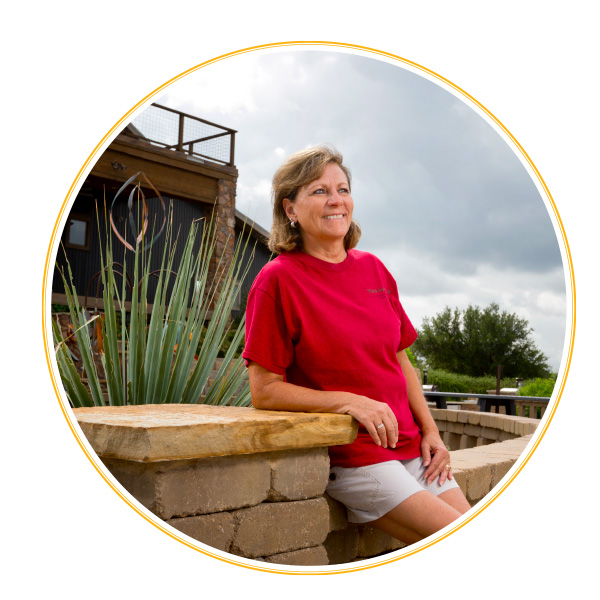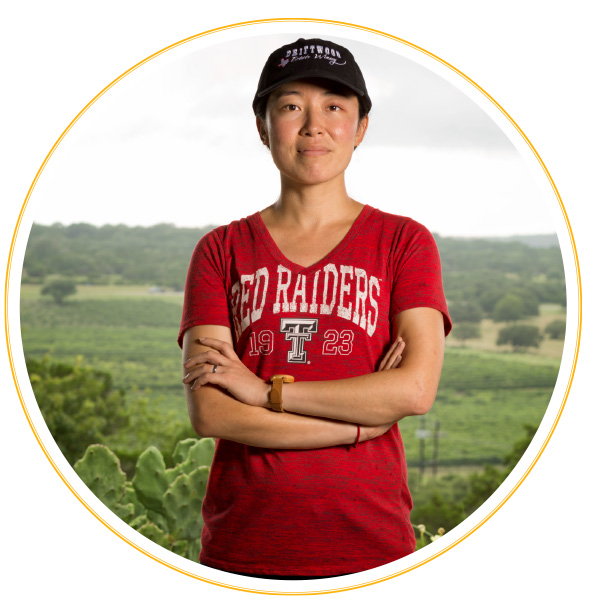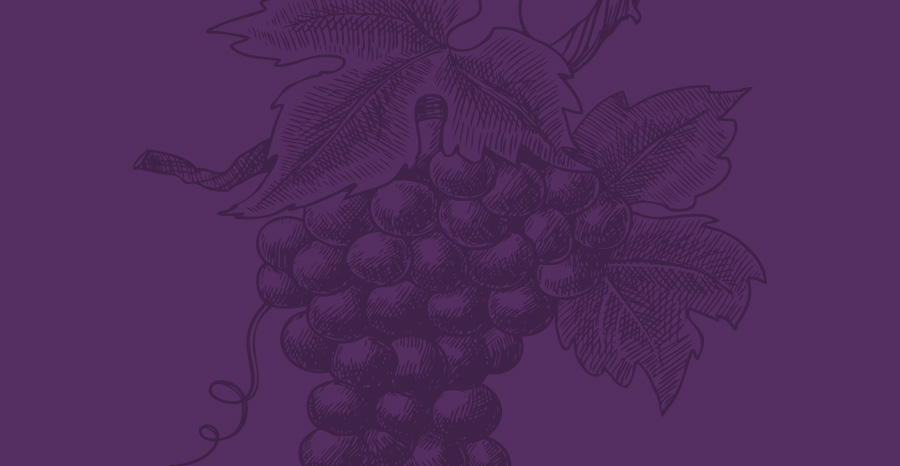Way back in 1971, near Fort Davis, Gretchen Glasscock planted a vineyard on the southern slope of Blue Mountain. It was not the first vine-yard in Texas — that honor goes to Spanish missionaries who planted grapes near El Paso. Before Prohibition, the state has around 25 wineries. But what with one law and another, wine fell from grace.
Glasscock helped change that by helping pass the 1977 Texas Farm Winery Act, which provided workarounds for vineyards in dry counties. She is just one example of the pioneering women in wine in the Lone Star State.
Because many Texas vineyards evolved from ranch land or farm land, they are often jointly run by husbands and wives, who eventually bring their families into the business. Rock & Vine spoke with four Hill Country women, all of whom bring their creativity and good sense to the business of wine.
BUNNY BECKER : Becker Vineyards
Editor’s note: Bunny Becker died Aug. 5 just as our print publication returned from the press. We send our condolences to the Becker family and our appreciation for her role in helping shape the Hill Country wine region.
Bunny Becker and her husband, Dr. Richard Becker, wanted a little house on about an acre of Hill Country land and no yardwork. They found a historic German cabin on 100 acres and learned the family didn’t want to break up the property. So they went big and made the land another home. It was Dr. Becker who decided to plant a vineyard.

“I’m more conservative, so I said, ‘Let’s plant one acre and see how we do.’ But they said, ‘No, Bunny, you have to have the whole deal.’ So we did 13 acres,” she said.
Those 13 acres have grown to 56. In addition to its own vineyard, Becker is the largest purchasing winery of Texas grapes. Despite being busy with guests each weekend, Becker Vineyards still feels welcoming.
“That’s always been Bunny’s focus. She wants people to feel like they’re a guest in our home,” Dr. Becker said.
I’m more conservative, so I said, ‘Let’s plant one acre and see how we do.’ But they said, ‘No, Bunny, you have to have the whole deal.’ So we did 13 acres.
Bunny Becker
The estate includes The Library, the cellar tasting room of the most exclusive wines, and the Lavender Haus event center, where monthly Chef’s Table dining experiences pair the finest Becker wines with a gourmet lunch by Chef Michael Lockhart. The tasting room includes framed White House menus of all the state dinners that have featured Becker wines. In every venture, from adding lavender fields to creating a new Claret with Coppola Wines for H-E-B, the Beckers work as partners.
“I think she’s smarter than I am,” Dr. Becker said, of his wife. “I’m more the risk-taker. I take the risks, and she makes them work.”
In 2018, Becker won four double gold medals at the San Francisco Chronical Wine Competition. And they were the first vineyard in Texas to plant viognier, even though a winemaker advised against it.
“The guy said, ‘This is Texas. You’ll never sell a bit. They won’t be able to pronounce it.’ We said, ‘We’re gonna do it anyway.’ It’s been a very successful wine for us,” Becker said.
Renowned California wine-maker Robert Mondavi tasted the viognier early on and encouraged them to keep it up.
One of Becker’s favorite growers is Brenda Canada, in Plains, whose grapes grow in rocky soil. Canada Family Vineyards grows cabernet, chardonnay and malbec for Becker.
“She was a schoolteacher, and when she retired, she told her husband, ‘I’m gonna plant a vineyard’ and he said, ‘You’ve got to do it by yourself,’ and she did!’” Becker said.
Much of the art on Becker’s bottles was created by the late Tony Bell, a friend of Dr. Becker’s. The malmsey’s label is a portrait of Becker, painted by her late father.
“When we first made our label, they said, ‘Make a pretty one because women are the ones who buy it,’” Becker recalled.
Over the 27 years Becker Vineyards has been in operation, Becker has seen more women get involved in the industry, and not just in the tasting room.
“They’re involved in vineyard choices and decisions,” she said, noting her decision to open a second tasting room in downtown Fredericksburg, in the old Buick dealership.
“I call it Becker Buick,” she said.
KAREN DEBERRY : Torr Na Lochs
While living in Scotland, Karen DeBerry and her husband, Blake, purchased a ranch outside Burnet, with the intent to have a cattle ranch and a place to retire. Instead they planted a vineyard, to which they gave the Gaelic name Torr Na Lochs, meaning Hill over Lakes. The tasting room and open patio overlook Inks Lake and Lake Buchanan.

Because her husband hasn’t yet retired, DeBerry oversees most of the work.
“I manage the vineyard. I’m an accountant by training, so I handle bookkeeping,” she said. “We harvest together, crush together, but I begin the winemaking process on my own because I’m here and he’s not.”
DeBerry earned her viticulture certification from Texas Tech University at Fredericksburg in 2014, the same year they planted their first grapes. Unlike most vineyards, which don’t produce a usable crop for the first few years, Torr Na Lochs didn’t have to wait.
“Our first vintage was made with fruit from one-year-old vines,” DeBerry said. “We did a lot of special preparation at planting that gave our vines a good head start.”
Some of that preparation involved an emphasis on sustainability.
“I don’t like spraying chemicals. I never have. I teamed up with AgriOzein. It makes ozone gas, and it’s 100 percent safe,” DeBerry said. “We collect rainwater from two buildings, so we have just under 100,000 gallons of rainwater storage. We collect the condensation from air conditioning units and wastewater from reverse osmosis water production, and it goes into irrigation tanks. We’re on solid granite outcroppings, so every drop of water counts, literally.” Torr Na Lochs also uses solar-powered water wells.
Our first vintage was made with fruit from one-year-old vines. We did a lot of special preparation at planting that gave our vines a good head start.
Karen Deberry
The winery’s tagline, “From Rocks to Wine,” captures two ideas: that the vines grow in decomposed granite and that clearing the land meant pulling out a lot of rocks.
“All the rock on the exterior of the building came from the site,” DeBerry said. “Our rock mason wasn’t too happy about that because of irregular sizes and shapes.”
The 2015 Estate Syrah and the 2016 Orange Muscat both won gold at the 2019 San Francisco Chronicle Wine Competition. DeBerry says the recently released 2017 Montelpulciano, grown in the Texas High Plains, is “flying off shelves.”
“Our wines are typically dry, but because they’re so fruit-forward they’re very balanced and very drinkable. What we’ve become known for in our short history, four years open to the public, is dry red wines,” she said.
In February the winery acquired its own bottling line.
“It’s a great addition to our facility. Now we have the entire process under our control,” DeBerry said.
Although she got too busy running a business to complete her enology certification, DeBerry’s oldest daughter did finish.
“She stepped in and did that program in my place. We’re hoping they will be willing to take over the business someday,” she said.
MEI NEWSOM : Newsom Vineyards
When Yanmei Zhang Newsom came to Texas Tech University in 2009 to pursue a graduate degree in enology, Lubbock was still dry.
“I was surprised: How can they have an enology program when the entire city is dry? One year later, in 2010, Lubbock finally became wet,” she said.
Newsom came from Shanghai, China, to study wine with Dr. Brent Trela, whom she met at a winemaker challenge. He was intrigued by her undergraduate background in table grapes and recruited her as a graduate assistant.

While in the Panhandle she met her husband, Nolan New-som, and married into a wine family. Newsom Vineyards has been growing grapes for more than 30 years in Plains.
“It’s 100 percent Texas High Plains wine. We don’t source any other fruit, don’t buy any fruit,” Newsom said.
In 2016, Newsom and her husband opened a Newsom Vineyards tasting room in Comfort. He works there full time.
“In our tasting room right now, because we’ve been in the industry for so long, we have very good connections with all the winemakers in the state,” Newsom said, including partnerships with Bending Branch Winery, Calais Winery, Flat Creek Estate and Lewis Wines.
Before moving to the Hill Country, Newsom worked in Napa and at Texas Custom Wine Works. Coming to this part of the state meant getting a chance to make her own wine.
Since 2016, she has worked as winemaker at Driftwood Estate Winery. Driftwood’s 2018 Viognier and 2018 Dry Rosé won gold at the 2019 San Francisco Chronicle Wine Competition. For the Newsom Vineyards own label, she made a 2018 Pinot Grigio and a 2018 Albariño.
Newsom says being a wine-maker is all about making decisions.
Women can be very good winemakers. My opinion is with a man, sometimes the wine has a male gender. The more delicate wine is more female-feeling.
Mei Newsom
“I decide what wine style that batch of grapes is going to be, either sweet or dry, or if I want it fruit-forward or more Old World-like, which means less fruity,” she said, adding that different winemakers can use the same fruit and get very different-tasting wines.
“Like a dry orange muscat. Many people never heard of it, but if a winemaker decides to make it dry, it can be dry,” she said.
Also, whether a winemaker is male or female can impact the taste of wine.
“Women can be very good winemakers. My opinion is with a man, sometimes the wine has a male gender. The more delicate wine is more female-feeling,” Newsom said.
Like Texas, Newsom says China’s wine industry is expanding.
“It’s very similar to the Texas market. It’s growing, it’s booming. I’ve been to some premium wine regions,” Newsom said.
She describes Texas as “still a big sweet wine market, but I can tell so many people are moving on to drinking more dry and bolder premium wine,” she said.
SUSAN AULER : Fall Creek Vineyards
Texas wines trace their roots to Susan Auler of Fall Creek Vineyards, who has been both a founder and evangelist for the industry since the 1970s.
Auler’s husband, Ed, had a ranch near Tow that had been in his family for generations. In 1973, the Aulers took a trip to France to look at cattle to breed with their Angus herd.

“I said very innocently, ‘Why don’t we take time to see the major wine regions?’ Back then there was certainly no signage, maybe a 13th century stone marker,” Auler said. “Ed sent our ranch manager to go over and see the folks at Texas A&M and see if anyone knows anything about growing grapes.”
The Aulers had good timing. The next year the bottom fell out of the cattle market. They planted their first vines in 1975, and Fall Creek Vineyards brought out its first vintage in 1979. The following year Ed left his law practice to ranch grapes.
Susan focused on the public relations of wine, which meant a lot more than advertising. Part of her mission was getting Texas established as an AVA, or American Viticulture Area.
“It was apparent immediately that we needed to create an identity for the Hill Country as Texas wine country,” Auler said.
While her husband navigated the bureaucracies, Auler made friends with winemakers in California, who became mentors.
“A friend introduced us to André Tchelistcheff, the winemakers’ winemaker. He put California wine on the map. He’s a Russian immigrant. He tasted our third-leaf cabernet sauvignon, and in his heavy Russian accent said, ‘Plant more!’” Auler said.
As Fall Creek’s wines gained prominence, Auler partnered with the celebrity chefs of the ’80s Southwestern cuisine movement — Dean Fearing, Robert del Grande and Stephan Piles. She created the Texas Hill Country Wine & Food Festival that same decade. All her work went toward making Texas wine world-renowned.
Fall Creek Vineyards has a commitment to what Auler calls “Texas terroir.”
“The French have the word terroir — it means soil, wind patterns, air, climate of that specific vineyard,” she said. “We’re well-rooted in time and place. We’ve been making wine from different regions of the Hill Country and Texas, so we know what grows where. It’s all about matching the right variety to the right soil.”
With five vineyards — two in the Hill Country, one north of Big Bend and two in Driftwood —the Aulers have learned not only about terrior in different regions, but from row to row of the same vineyard.
Four and a half years ago they opened a second tasting room in Driftwood, across from The Salt Lick BBQ. Salt Creek Vineyard, overseen by Scott Roberts, is Fall Creek’s main source for grapes. Roberts works closely with Sergio Cuadra, the Aulers’ Chilean winemaker.
“Sergio really opened our eyes that anything has a chance of doing well in Texas. He said, ‘It’s all about the soil. Don’t worry about the heat — it’s hot in Spain, it’s hot in Australia, it’s hot in the Middle East, and that’s where grapes were discovered 8,000 to 10,000 years ago,’” Auler said.
Still, Auler says the biggest challenge to growing grapes in Texas comes at harvest-time.
“In cooler climates you might have a week to 10 days to harvest. In Texas you have 36-48 hours,” she said.
As Texas’ wine industry grows, Auler sees more women getting involved.
“Women have a good work ethic, and this is very labor-intensive. It’s farming first. If it doesn’t happen right in the vineyard, in won’t happen right in the winery,” she said.
The French have the word terroir — it means soil, wind patterns, air, climate of that specific vineyard. We’re well-rooted in time and place. We’ve been making wine from different regions of the Hill Country and Texas, so we know what grows where. It’s all about matching the right variety to the right soil.
Susan Auler
After winning numerous gold and double gold medals at international competitions, Fall Creek’s profile was raised even higher last year after wine critic James Suckling invited the winery to submit selections for his “American Wine Revolution” report. Four wines scored a 90 or above.
In October, Fall Creek’s 2016 ExTerra Tempranillo received Suckling’s endorsement via Instagram: “Outstanding Tempranillo from Texas. James says a bit like Toro, @stockwine says Ribera … either way this is #greatamericanwine.” The post included a fistbump emoji.
“That is the best thing be-cause there are three top wine reviewers in the country, and he’s one of them. None of the three have decided to review Texas wines before. Then for us to get these excellent scores, it elevates the entire industry,” Auler said.
Amid this recognition, the first lady of Texas wine still sees Fall Creek as a family business.
“It’s been a great adventure for our entire family. The boys grew up picking those grapes and getting their buddies from the basketball team to help,” she said. “Alsacian friends, they’ve been making wine for 400 years, and he loved to get in the lab and taste with Ed. Out at Tow, the boys would be playing. He’d say, ‘Let them smell the wines.’ I do that with my grandson now.”


